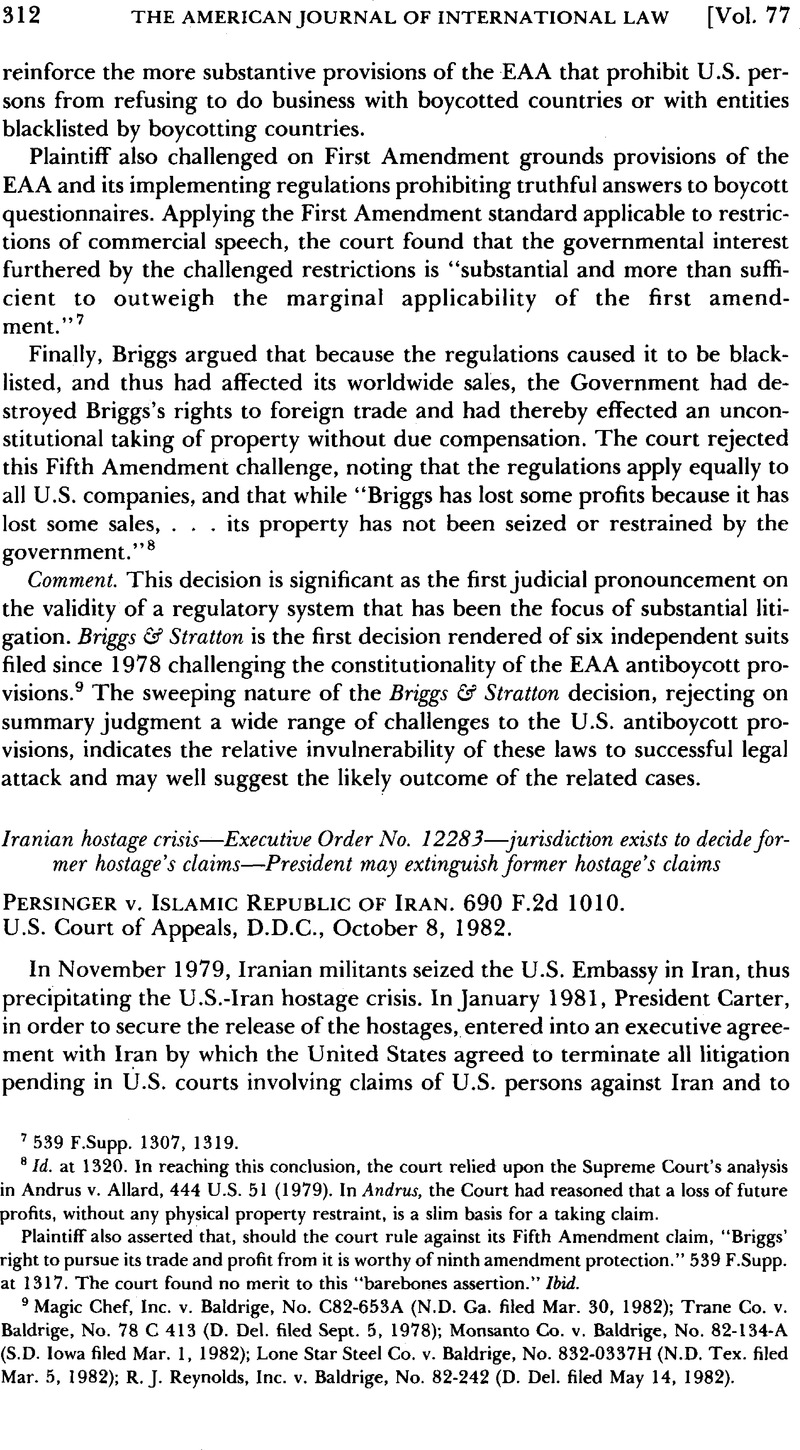No CrossRef data available.
Article contents
Persinger v. Islamic Republic of Iran. 690 F.2d 1010
Published online by Cambridge University Press: 27 February 2017
Abstract

- Type
- Judicial Decisions
- Information
- Copyright
- Copyright © American Society of International Law 1983
References
1 Since the United States had severed diplomatic relations with Iran, the agreement was embodied in two Declarations of the Government of Algeria.
2 46 Fed. Reg. 7927 (1981). Executive Order No. 12283 reads, in relevant part:
The Secretary of the Treasury shall promulgate regulations: [a] prohibiting any person subject to U.S. jurisdiction from prosecuting . . . any claim against the Government of Iran . . . ; [b] prohibiting any person not a U.S. national from prosecuting any such claim . . . ; [c] ordering the termination of any previously instituted judicial proceedings . . . ; and [d] prohibiting the enforcement of any judicial order issued in the course of such proceedings.
The court noted that subsections [c] and [d] did not apply to Persinger’s case since his lawsuit was initiated after the executive order had been issued. 690 F.2d 1010, 1015.
3 Id. at 1016.
4 Section 1605(a)(5) reads in part:
A foreign state shall not be immune from the jurisdiction of courts of the United States . . . in any case—
. . .
. . . in which money damages are sought against a foreign state for personal injury or death, or damage to or loss of property, occurring in the United States and covered by the tortious act or omission of that foreign state . . . ; except this paragraph shall not apply to—
(A) any claim based upon the exercise or performance or the failure to exercise or perform a discretionary function regardless of whether the discretion be abused. . . .
5 690 F. 2d at 1017 (citations omitted).
6 Since the district court had dismissed Persinger’s complaint without taking evidence on this point, the court of appeals assumed the allegations to be true.
7 See 690 F.2d at 1018–19.
8 Id. at 1019.
9 Id. at 1020 (quoting Dames & Moore, 453 U.S. at 668, in turn quoting Youngstown, 343 U.S. at 637).
10 690 F.2d at 1020 (quoting Dames & Moore, 453 U.S. at 668–69, in turn quoting Youngstown, 343 U.S. at 637).
11 The court noted the long history of executive branch activity in settling foreign claims and continued congressional acquiescence therein. The court also emphasized that the executive order had been in existence for 1½ years without any sign of congressional disapproval.
12 690 F.2d at 1022.
13 Id. at 1022–23 (quoting Youngstoum, 343 U.S. at 637). The court declined to address Persinger’s Fifth Amendment taking claim because it did not afford a basis for invalidating the executive order and because it could presumably be pursued in the Court of Claims under the Tucker Act, 28 U.S.C. §1491 (1976). In this regard, it is interesting to note Justice Powell’s concurrence in Dames & Moore, in which he stated that the Government must compensate individuals whose claims are bargained away in order to further U.S. foreign policy objectives. But see Chas. T. Main Int’l, Inc. v. Khuzestan Water & Power Auth., 651 F.2d 800, 809 n.13 (1st Cir. 1981), where the court, in discussing the International Emergency Economic Powers Act, questioned whether an unliquidated claim could be considered either a “right” with respect to property or an “acquisition” of property.
14 For example, the Supreme Court in Dames & Moore looked to the International Claims Settlement Act of 1949, 22 U.S.C. §1621 et seq. as amended (1980), as evidence of Congress’s implicit approval of President Carter’s action to suspend claims of U.S. nationals. As Justice Rehnquist acknowledged, the purposes of the Act were to allocate funds received from the foreign government to the claimants and to establish procedures for distributing these funds. Yet, no such alternative remedies are available to Persinger.
15 See 453 U.S. at 658–62.
16 The court of appeals has granted Persinger a rehearing, and as of this writing the case has not been resolved.


